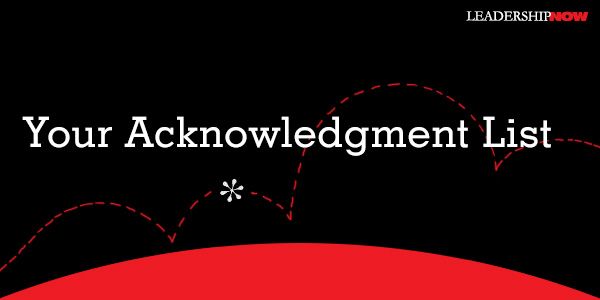Your Acknowledgment List

I WANT TO to draw your attention to two closely related posts by Rick Smith. They address two important issues. First, the need to get good, solid support and feedback, and second, the importance of appreciation. Here are some of the key points he shared:
Earlier in my career, I was an executive recruiter, and what always struck me is just how lonely these men and women were. Not Tom Hanks on a desert island lonely – these people were surrounded by people clamoring for their attention. Rather, they were lonely in the sense that they rarely if ever could find a safe place to collaborate with peers around real problems. Their superiors were always looking for the answers, their subordinates were looking for direction. When they were able to interact with those outside of their companies, it was almost always at functions for their industry (i.e. their competitors). Everywhere these executives go, that have to present themselves as if they know the answers, as if they are supremely confident. But guess what? Even the most heralded execs share the same uncertainties as the rest of us. They just aren’t allowed to show it.
Peer support is critical to any career. But the higher you go in a leadership role, the fewer opportunities you have to lean on peers for deliberation and problem-solving. For any leader (yes, including the president), maintaining a trusted support network of true peers is critical.
To address this issue, I started World 50, Inc. in 2004, initially bringing together the world’s top 50 marketing executives (in a group called Marketing 50). For this small group of executives, it was as if a light was suddenly turned on. These people were STARVED for a safe environment. Their insecurities and frustrations came spilling out as if from a pressure cooker. They immediately jumped in a started to help solve each other’s problems. As one member commented, “It was as if I was talking to myself a year from now. How valuable is that!” Our firm quickly launched similar peer groups for nearly every office in the executive suite, with each group addressing this same, basic need.
* * *
The days of “buying” people’s time, effort and attention are over. We are all volunteers. We actively choose who we will work for, and how hard we will work for them. We choose who our clients and partners will be. We choose whom to let into our inner circle of friends, those whom we will offer unconstrained support. And we choose our “weak ties,” those outside of our day-to-day whom we will offer a new idea or perspective, and occasionally our direct assistance.
To be successful, you need to earn every relationship. Leadership in the 21st century is based almost entirely on one’s ability to recruit and inspire others toward the future you are trying to create.
This thought became very clear to me this week, as I sat down to write the acknowledgments section for my next book, " title="The Leap" target="_blank">The Leap: How Simple Changes Can Propel Your Career from Good to Great (September 2009). Within an hour, I had cited nearly 100 people who had made a material contribution to my life’s successes in just the last few years.
Take a moment to write down your Acknowledgment list. Have you taken time to let them know you are grateful for their contributions? Would you show up on their acknowledgments list? How many volunteers do you have working for you?
* * *

Follow us on
Instagram and
Twitter for additional leadership and personal development ideas.
* * *

Posted by Michael McKinney at 10:31 AM
Permalink
| Comments (0)
| This post is about Communication
, Learning










